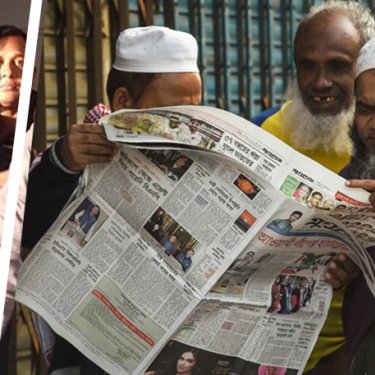Serious press freedom violations mar Bangladesh’s election

Reporters Without Borders (RSF) condemns the serious press freedom violations that have accompanied Bangladesh’s 30 December general elections, in which journalists have been attacked or jailed and a TV news channel was taken off the air.
The post-election era has begun badly for press freedom. A reporter was arrested yesterday and was placed in preventive detention today for “providing false information in an effort to make the election look questionable,” the police said.
The victim was Hedait Hossain Molla, who covers the southern city of Khulna for the Dhaka Tribune newspaper and the Bangla Tribune news website. All he did by way of “false information” was report that the number of people who voted in his electoral district was 22,419 more than the number of registered voters.
Another journalist who reported the same irregularity, Rashedul Islam of the Daily Manabzamin, went into hiding after the same charge was also brought against him. Molla and Islam are now facing the possibility of a 14-year jail sentence under the draconian digital security act that was adopted last October.
“We call on the Bangladeshi authorities to immediately drop the charges against these two journalists,” said Daniel Bastard, the head of RSF’s Asia-Pacific desk. “Their only crime was to do their job to monitor the polling, as any journalist should in a functioning democracy. The repeated press freedom violations accompanying these elections have ended up undermining the credibility of the results.”
Physical attacks
Several journalists were the victims of physical violence on election day. Daily Star photographer Kazi Tahsin Agaz Apurbo was attacked by ruling party activists while taking photos of a Dhaka polling station. Kafi Kamal, a reporter for the Manab Zamin newspaper, had to be hospitalized after a similar attack in Dhaka.
Shahidul Alam, a famous photojournalist who was recently released from prison, was injured in a scuffle that began when he and fellow journalist Sumon Paul tried to take some photos. Paul received several punches. Around 20 activists attacked Jubair Rakesh of the daily Manob Kantho, smashing his camera.
Al Amin, a reporter for the Cvoice24.com news website, was attacked by about 15 activists when he tried to cover the polling in Chattogram (ex-Chittagong), Bangladesh’s second largest city.
Denied access
Despite having accreditation from the electoral commission, at least seven Daily Star journalists were meanwhile denied access to polling stations by police or by representatives of the ruling coalition.
Cable TV operators suddenly turned off the signal of Jamuna TV, a news channel with a reputation for independence, on the evening of 28 December, four days after around 30 armed individuals attacked journalists working for Jamuna TV and its sister newspaper in the hotel where they were staying, as RSF reported last week.
Bangladesh is ranked 146th out of 180 countries in RSF’s 2018 World Press Freedom Index.



